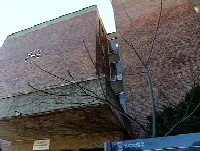|
|
|
|
|
|
|
News & Views item -
|
![]() For the Second Time in Ten Days The Age Features Higher Education in Its
Lead Editorial. (February 20, 2007)
For the Second Time in Ten Days The Age Features Higher Education in Its
Lead Editorial. (February 20, 2007)
 The
times they may just be a changin'.
The
times they may just be a changin'.
Ten days ago The Age wrote a stinging editorial rebuke on the Coalition's decimation of academic mathematics. The broadsheet's views were summed up by, "It requires little vision, for anyone willing to look, to recognise that there is a train wreck on the horizon."
Now it points out, "In recent weeks, HECS has... surfaced... as part of the phoney federal election campaign. The Opposition Leader, Kevin Rudd, has announced another instalment in his so-called "education revolution". Mr Rudd has vowed to cut the accumulated HECS debt of a science and maths graduate from more than $21,000 to $12,000, or the annual rate of about $7000 to $4000, from 2009. The HECS repayments of those graduates would be halved if they worked in a relevant occupation, in particular teaching... The Opposition claims that almost 50 per cent of senior physics teachers and 25 per cent of senior chemistry teachers have not majored in those areas and that a quarter of science teachers do not have a science qualification. The claims are supported by a Department of Education and Science audit, which predicts that in six years there will be a shortage of 20,000 scientists and engineers."
And The Age points out that there are no data to support the contention that cutting HECS fees for a given study area will significantly raise student numbers. Macquarie University's Vice-Chancellor, Steven Schwartz has suggested that the repayment of the debt is sufficiently far in the future for students not to be significantly influenced by its size, at least as its currently presented.
While the paper then goes off onto a small digression about the lack of an egalitarian approach (asking what if anything makes the sciences better than the humanities for the nation's wellbeing?) it returns to the heart of the matter, "Australia's public spending on higher education, expressed as a percentage of GDP, is below the OECD average. When this is coupled with a 25 per cent increase in HECS fees since 2004 and when 20,000 people in Victoria missed out on a HECS place last month, then there is an urgent demand to look at the issue in its entirety, not just in a piecemeal fashion.... A challenge was put to the Federal Government [by Victorian Premier, Steve Bracks] to revamp teaching courses at universities to attack declines in literacy and numeracy. It must be hoped that this debate, like others between state and Commonwealth, does not degenerate into cheap politics. Is not our children's education, and therefore the future of this country, worth more than that?"
What is not discussed are the details that are required to be addressed to bring the whole of the university sector back to state where it is not seen to be really working quite well -- for a cripple.
Here it is worthwhile to recall the first couple of paragraphs from the Introduction of the September 2001 Senate Committee report Universities in Crisis, remembering that at the time Coalition members were in the minority.
The Australian university system is at the intersection of two areas of national crisis – research and education. Australia’s deteriorating research performance is widely seen as a factor in the recent weakness of the currency. Equally significantly for our long-term economic performance and social values, our education system is under severe stress and is failing to deliver the enhanced education needed for modern economy.
Although the causes of this crisis are complex, the most important single factor is poor government policy. Not only have governments reduced expenditure on education relative to GDP when a rational assessment of our economic needs would dictate higher expenditure, but the diminished resources available to the system have been, to a significant extent, dissipated in the pursuit of ideological agendas and managerial fads.
And while the Coalition members of the committee refused to sign off on the report those that did were Australian Labor Senators Jacinta Collins (Chair), Trish Crossin and Kim Carr, and Australian Democrat Natasha Stott Depoja.
Perhaps Labor leader Kevin Rudd might take a few moments to thumb through the report, it's still accessible on the Web: